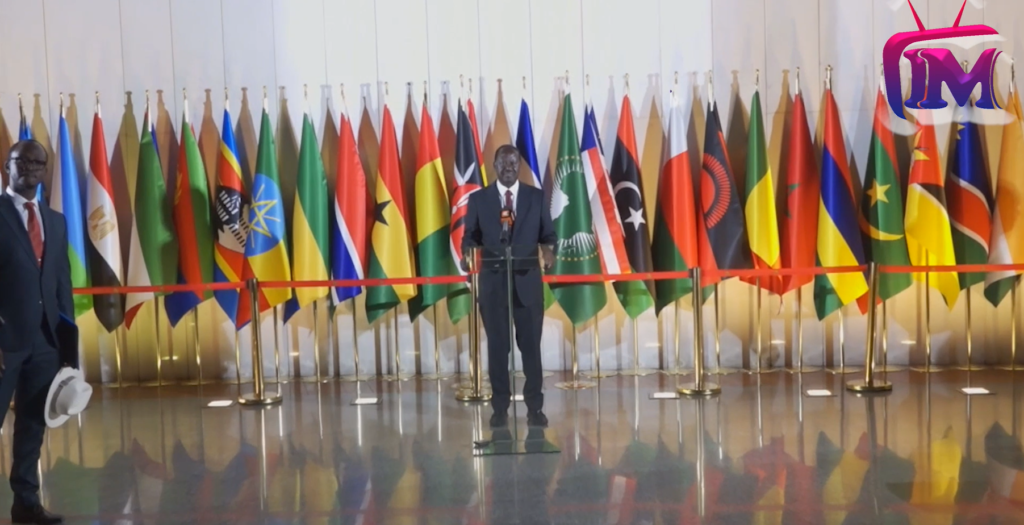Former Kenyan Prime Minister Raila Odinga unveiled an ambitious manifesto for his African Union Commission (AUC) chairmanship campaign in Addis Ababa yesterday, marking a significant milestone in his quest to lead the continental body.

AUC Charmanship Candite Raila Odinga Launching His Bid In Addis Ababa, Ethiopia
Speaking to a packed audience in the Ethiopian capital, Odinga outlined a comprehensive plan to transform Africa’s economic landscape and strengthen inter-continental cooperation. His presentation came just months after receiving a strong endorsement from Kenyan President William Ruto.
“Africa’s time is now,” declared Odinga, addressing delegates from across the continent. “We must work together to build an Africa that is economically strong, politically united, and globally competitive.”
The veteran politician’s manifesto centres on four key pillars that he believes will drive African development forward. First among these is economic transformation, with Odinga proposing aggressive measures to accelerate growth across all 55 member states of the African Union.
A cornerstone of his economic strategy involves boosting intra-African trade, which currently lags behind other continental blocs. Odinga emphasised the need to break down trade barriers and create more efficient systems for cross-border commerce.
“We cannot continue to trade more with the outside world than among ourselves,” he stated. “Our prosperity lies in strengthening our internal markets and building robust trade relationships between African nations.”
Infrastructure development features prominently in Odinga’s vision. He plans to champion major infrastructure projects that will connect African nations through improved transport networks, energy systems, and digital infrastructure.
The pursuit of financial independence stands out as another crucial element of his agenda. Odinga aims to reduce the continent’s reliance on external funding and develop sustainable financing mechanisms for African development projects.
President Ruto’s backing of Odinga’s candidature represents a remarkable shift in Kenyan politics. The two leaders, once fierce political rivals, have found common ground in their vision for African development. Ruto officially launched Odinga’s campaign in Nairobi on 27 August 2024, demonstrating Kenya’s united front in supporting his bid.
“This candidature transcends national politics,” explained a senior diplomatic source in Addis Ababa. “It represents Kenya’s commitment to driving positive change across the continent.”
The race for the AUC chairmanship has attracted strong candidates from several nations. Odinga faces competition from representatives of Djibouti, Mauritius, and Madagascar, making it one of the most closely watched succession races in recent AU history.
Political analysts view Odinga’s candidature as potentially transformative for the AU. Dr Sarah Mukundi, a political scientist at the University of Nairobi, believes his extensive political experience could be valuable for the organisation.
“Odinga brings decades of political experience and a deep understanding of African challenges,” she said. “His track record in championing democratic reforms and economic development could be exactly what the AU needs at this crucial time.”
The timing of Odinga’s bid coincides with growing calls for reform within the AU. President Ruto and other African leaders have expressed support for structural changes that would make the organisation more efficient and effective in addressing continental challenges.
If successful, Odinga would lead the AU’s executive arm during a critical period for African development. The continent faces numerous challenges, including climate change, security concerns, and the need for economic recovery post-pandemic.
His manifesto also addresses youth empowerment, technological advancement, and environmental sustainability. Odinga emphasised the importance of harnessing Africa’s young population for development while ensuring sustainable resource management.
“We must create opportunities for our youth,” he stressed. “They are not just our future; they are our present, and they must be at the centre of our development agenda.”
The election for the AUC chairmanship will take place in February 2025, giving candidates several months to campaign and build support among member states. The winner will succeed the current chairperson and lead the commission for a four-year term.
Odinga’s team has launched an extensive campaign strategy, including digital platforms and direct engagement with member states. His campaign website, railaodinga4auc.com, provides detailed information about his vision and proposed programmes.
As the campaign intensifies, observers note that the outcome of this election could significantly influence Africa’s development trajectory in the coming years. The successful candidate will need to navigate complex political relationships while driving forward the continent’s ambitious development agenda.
With his extensive political experience and comprehensive manifesto, Odinga has positioned himself as a serious contender for the AUC’s top position. Whether he can convert this strong start into eventual success will become clear in the months leading up to the February 2025 election.



















